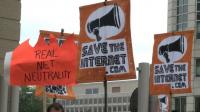
If you supported net neutrality by sending your response to the Telecom Regulatory Authority of India (TRAI), your email address is available out in the open.
This attracts spammers to take advantage of the database in order to send out fraudulent mails to millions of users. In India, digital literacy is still in its infancy and TRAI's carelessness increases the risk of cyber crimes in the nation.
Internet users widely protested TRAI's submission and sent their responses via Savetheinternet.in, a site which was created to help users support net neutrality. To do so, users had to use their personal email addresses by sending out a pre-answered questionnaire with a single click.
TRAI received over 11 lakh emails on its paper "Regulatory Framework for OTT services," which the regulator divided into three broad categories -- Comments from the Service Providers, Comments from the Service Providers' Association and Comments from other Stakeholders. The responses from individuals, organisations, startups and others fall under the third category. The regulator had set the deadline as 24 April for people to submit their views on the paper, which puts network carriers in charge for controlling the internet.
While it was expected that TRAI would share people's responses on its site in the name of transparency, exposing people's email addresses was a battered move. The consequences can be severe as email addresses are often linked to people's social media accounts, banks and businesses. TRAI could have easily avoided the fiasco by replacing few initial letters of the email address with asterisks or blurring it out completely.
TRAI's final verdict is still pending, which is understandable considering the review of millions of responses. In order to simplify the process, a Colombo-based LIRNEasia offered solutions like "word clouds, opinion mining and semantic analysis, all based on natural language processing," Firstpost reported. The final decision is expected to be announced in June or July, Rajeev Chandrasekhar, MP and net neutrality supporter told The Times Of India.

















